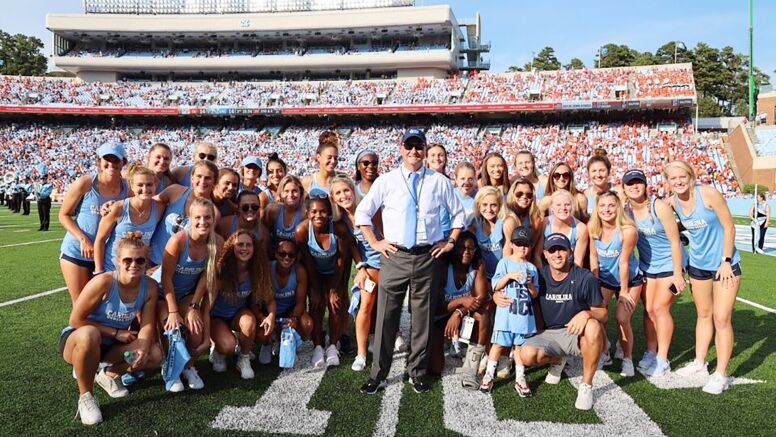News & Stories
What can a world championship soccer coach teach tech executives?

Cameron Keating (BSBA ’21), UNC Women’s Soccer Undergraduate Assistant Coach and former player, sees the connections between high performance in soccer and the tech industry.
If I’ve learned one thing since transferring to Carolina, it’s that ACC college soccer and the technology industry have a lot more in common than you’d expect.
Anson Dorrance, the head of our UNC Women’s Soccer program, has 22 national championships and a World Cup title to his name. I’m fortunate enough to have played for and now work with Coach Anson.
 On the tech front, working for Captain Elite, my family’s web-based research and training academy for youth soccer players in the U.S., has taught me the immeasurable value that tech brings to the world.
On the tech front, working for Captain Elite, my family’s web-based research and training academy for youth soccer players in the U.S., has taught me the immeasurable value that tech brings to the world.
As a fast-paced, highly competitive and team-oriented environment, college soccer closely resembles the atmosphere of top tech firms. And, in both soccer and tech, proper communication between leaders and subordinates is crucial to the success of the group.
Here are three aspects of communication that I find especially important:
- Building credibility among qualified people
- Valuing transparency
- Adapting to the “flat” organization
To discuss these ideas, I’ll share three of our soccer team’s core values that highlight why Coach Anson’s communication style is so effective, and why Captain Elite has been able to impact the lives of youth players across the country and abroad.
I believe every manager of an ambitious tech firm could learn from these rules.
Core Value #10: We play for each other.
Not every mid-to-top-level manager – even at the largest tech firms – are experienced engineers.
And Coach Anson will certainly admit that some of his assistant coaches, and even players, are more knowledgeable in specific areas of the game than he is.
So, how can you establish credibility with teammates or employees whose technical skills surpass your own?
First, invest in getting to know your team and offer support when they need it. One of Coach Anson’s favorite quotes sums it up nicely: “People don’t care how much you know until they know how much you care.”
You also can spend time learning basic terminology to build a shared vocabulary between you and your subordinates. This will clarify communication and give you a better idea of what’s going on in your organization.
For example, to communicate more effectively with our coders at Captain Elite, I’m teaching myself a few programming languages. I might never be a senior-level programmer, but understanding the basics of the work our developers do will serve as a platform for more efficient and effective collaborations with them.
Last, don’t be afraid to delegate. Set your team up for success by putting your people in positions where they can excel. For example, Coach Anson delegates much of the psychological research and data analysis to me because he knows these are two of my passions.
The best teams are made up of people with diverse skill sets and backgrounds, so use that to your advantage. Your credibility will follow.
Core Value #12: We want our lives to be never-ending ascensions.
Part of the UNC Women’s Soccer philosophy is about breaking down personal narratives so that we can construct an accurate view of ourselves and how we can improve. Coach Anson establishes a culture of constant improvement with his athletes and staff by being 100% honest with us. In multiple practices, I’ve heard him say, “If you want feedback, ask me. If you don’t, then don’t. Because if you ask, I’ll tell you what I think. And I won’t sugar coat it.”
This rhetoric might seem harsh, but really his transparency is liberating. If you want to know how to get more playing time, all you have to do is ask. And, just as importantly, when you do what he asks of you, you get the playing time. His combination of honest feedback and an entirely merit-based rewards system fosters an environment of rapid development for all players, no matter how good they were when they first entered the program.
Tech managers can do the same. The only way Captain Elite has maintained our relationship with our offshore developers is through frequent, clear and action-oriented feedback. The clarity of our message matters even more given the language barrier. As the head of product design in the summer of 2019, I learned the value of receiving and giving critical feedback with the goal of constant improvement in mind.
Managers who encourage employees to seek feedback, then give them honest, respectful and actionable feedback will see a skyrocket in productivity from their employees.
Core Value #7: We treat everyone with respect.
 Coach Anson is demanding and strongly opinionated, but he also shows an enormous amount of respect for each player, parent, coach and fan he meets. I’ve seen him turn his attention away from approaching reporters and towards a young girl when she ran up to ask him for an autograph after a game. If Coach Anson is talking to you, he is focused on you.
Coach Anson is demanding and strongly opinionated, but he also shows an enormous amount of respect for each player, parent, coach and fan he meets. I’ve seen him turn his attention away from approaching reporters and towards a young girl when she ran up to ask him for an autograph after a game. If Coach Anson is talking to you, he is focused on you.
He is quick to mention to the team how much he values their abilities and contributions. This communication style fosters an environment of mutual respect, where everyone sees the value in their teammates and themselves.
Like sports, technology is competitive and always evolving, so each team member’s full participation is necessary to sustain a competitive advantage. Motivate your employees to stay fully engaged by showing them how much you respect and value their abilities.
Tech start-ups often have “flatter” organizational structures that result in more frequent communication between executives and entry-level employees. As Captain Elite’s founder and CEO, my father speaks regularly with our developers, marketing team and product designers. This structure makes his communication skills even more crucial because his words affect the entire organization on a daily basis.
The greatest lessons I’ve learned have been from Coach Anson and Captain Elite. So, I hope these tips help you develop your communication skills so that you, too, can live on a never-ending ascension.